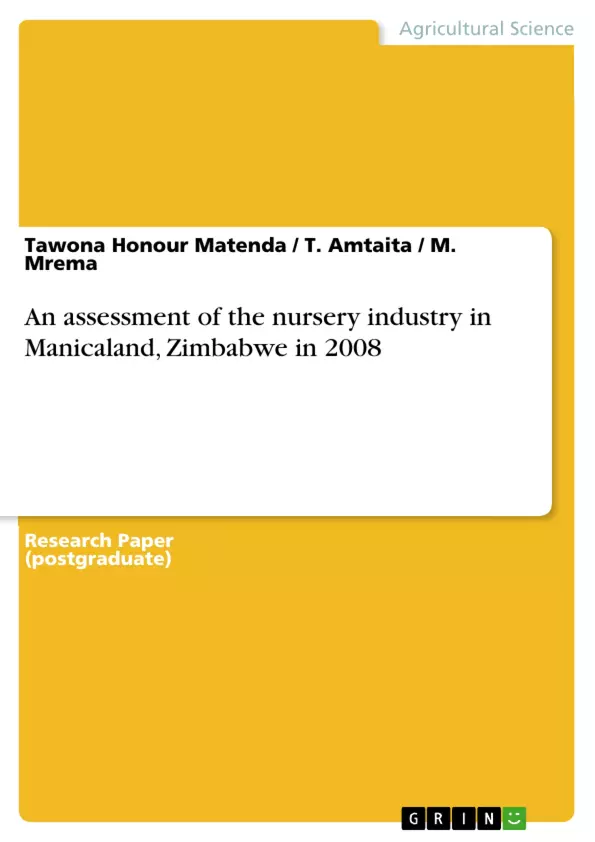ABSTRACT
Agricultural nurseries are key in the production of horticultural and forestry seedlings. Various nursery media is used to raise these seedlings. The study was aimed at determining the researchers’ views and opinions on the nursery practices that the farmers employ. The survey was carried out to establish the productivity and types of media used in the nursery industry within Manicaland, Zimbabwe. In this study, the survey was conducted at provincial level within five (5) selected districts of Manicaland Province. In each district, all the existing nurseries were selected. Data was analyzed using the descriptive analysis. Nursery holders were classified as entrepreneurs, farmers, local government owned and non –profit making organizations owned. Farmer nurseries were the largest category comprising of 56.4% of the total sampled population. Most of the seedlings were raised in containers with the exception of vegetable seedlings which were raised in seed beds. Nursery media comprising of top soil and compost proved to be most popular amongst nursery owners. Pine media used proved to be least used due to its low water holding capacity and lack of proper extension training on its use.
Inhaltsverzeichnis (Table of Contents)
- ABSTRACT
- INTRODUCTION
- MATERIALS AND METHODS
- RESULTS
- Nursery ownership and land holding
- Ownership by sex
- Production area
- Opinion on nursery expansion
- Farmers'
- City council
- Non-profit organization
- Entrepreneur
- Nursery media used and transportation
Zielsetzung und Themenschwerpunkte (Objectives and Key Themes)
This study investigates the nursery industry in Manicaland, Zimbabwe, focusing on the types of substrates used in seedling production and the operations of selected extension and registered nurseries. The research aims to understand the practices and challenges faced by nursery owners in the region.
- Types of nursery media used
- Productivity of extension and registered nurseries
- Ownership structure and demographics of nursery holders
- Factors influencing nursery expansion
- Role of women in nursery production
Zusammenfassung der Kapitel (Chapter Summaries)
The study reveals that farmer nurseries are the most common type in Manicaland, accounting for over half of the surveyed population. The majority of seedlings are raised in containers, with vegetable seedlings being the exception. The most popular nursery media comprises topsoil and compost, while pine media is less prevalent due to its low water-holding capacity and a lack of proper extension training on its use.
The research further explores the ownership structure of nurseries, finding that entrepreneurs, farmers, local government entities, and non-profit organizations are all involved. The study examines the role of women in nursery production, finding that while many women assist in the process, their participation is more prevalent as owners in districts like Chipinge, Mutasa, and Makoni.
The study investigates the land area allocated to nursery production, noting that most nurseries operate on less than 100 square meters. The research also analyzes the opinions of nursery owners regarding expansion, finding that a variety of factors, including partnerships, demand, land availability, and resources, influence their decisions.
The research explores the types of nursery media used, emphasizing the dominance of topsoil and compost combinations. The study concludes with insights into the transportation of seedlings, highlighting the role of extension services in disseminating information on media methods and the importance of accessible, locally available materials.
Schlüsselwörter (Keywords)
The primary focus of this research centers around the nursery industry in Manicaland, Zimbabwe, exploring various aspects like the types of nursery media utilized, the productivity of extension and registered nurseries, the ownership structure, and the challenges faced by nursery holders in the region. Key terms and concepts include: nursery practices, seedling production, substrate types, land ownership, nursery expansion, women's role, and extension services. The study also highlights the importance of sustainable and environmentally friendly practices within the nursery sector.
- Arbeit zitieren
- Tawona Honour Matenda (Autor:in), T. Amtaita (Autor:in), M. Mrema (Autor:in), 2010, An assessment of the nursery industry in Manicaland, Zimbabwe in 2008, München, GRIN Verlag, https://www.grin.com/document/181406



